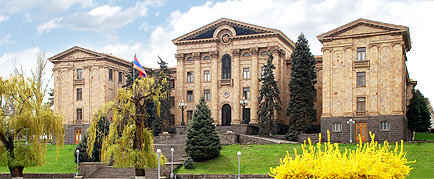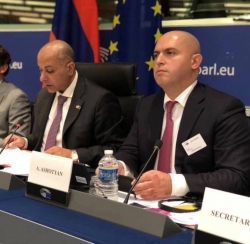On October 24, in Strasbourg at the end of the first meeting of the EU-Armenia Parliamentary Partnership Committee presided over the Co-Chairs Armen Ashotyan and Sajjad Karim a final statement and recommendations were adopted, which were based on the Article 365 of the RA-EU Comprehensive and Enhanced Partnership Agreement.
The adopted document reflects the current character of the RA-EU relations and the positions in numerous spheres and issues of bilateral importance.
The document, particularly touched upon the inner-political life of Armenia, related to which the Parliamentary Partnership Committee calls on all political forces in Armenia to show restraint for avoiding the growth of tension in the inner-political field, and refrain from any manifestation of the word of hatred, intolerance and violence, aiming at not weakening the stability of the country and the public solidarity. The Committee also calls on the Armenian authorities to provide calm conditions for holding the parliamentary elections in the atmosphere of democracy, justice and transparency, giving opportunity all political forces to hold pre-electoral campaigns. The document notes that the National Assembly should be given opportunity to implement its functions in the fringes of the Constitution. The Committee also reminds the importance of the principle of the separation of the relevant legislative, executive and judicial power complying with the Constitution.
In this context the document also calls on the Armenian authorities to fulfill all recommendations of the Venice Commission and the OSCE/ODIHR, especially those relating to the reforms of the Electoral Code, if necessary also apply to the support of the international community, for example, the European Union, particularly the European Parliament.
With regards to the issue of the Nagorno Karabakh peaceful settlement, the Committee expresses regret for the continuous human losses as a consequence of the conflict. The document also states that the Committee expresses deep regret related to the regular violations of the ceasefire regime, which takes servicemen’s and civilians’ lives from both sides, impedes the social-economic development of the whole region. The Committee also accepts that the current status quo is neither admissible nor stable, and the conflict cannot have a military solution.
In the document The Partnership Committee reaffirms its unchanged support to the OSCE Minsk Group Co-Chairmanship and the fundamental principles of 2009, which is also in the RA-EU Comprehensive and Enhanced Partnership Agreement: particularly it relates to the goals and principles, which are connected with the use of the force or refuse its threats, the territorial integrity of the states and the peoples' legal equality and self-determination, as well as the efforts of reaching the peaceful settlement of the conflict/ The Committee underlines that the efforts shall be based on the international peace and the universal principles of providing security, which is fixed by the UN Charter and the OSCE Helsinki Final Act and other multi-lateral documents, which underscore the importance of the existing agreed formats regarding the peaceful settlement. The Committee also emphasizes the availability of the means for providing armament control and trust, security.
According to the Final Statement, the Committee calls on the authorities of Armenia and Azerbaijan to hold negotiations at high level and to be committed for the real means of strengthening the trust and the innovated dialogue, for weakening the tension in the line of contact, as well as to stabilize the security situation and boost more constructive atmosphere for further negotiations, aiming at the peaceful settlement of the conflict.
The Parliamentary Partnership Committee also reaffirms its whole commitment to exclusively peaceful settlement of Nagorno Karabakh conflict, as it is proposed by the OSCE Minsk Group Co-Chairs and which is supported by the European Union and the European Parliament.
The adopted document also notes the Armenian Genocide international recognition process. In this context the Committee recalls that December 9, 2018 sees the 70th anniversary of the Convention on the Prevention and Punishment of the Crime of Genocide and calls on the EU Member States the Armenian Genocide. The Committee also distinguishes the fact that the abovementioned has become a topic of open and public disputes in Turkey during recent years.




 25.10.2018
25.10.2018
